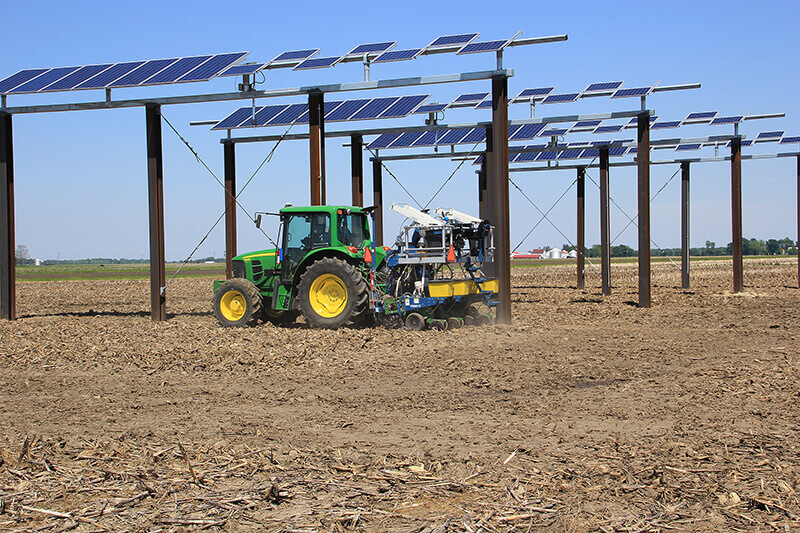August 8, 2019
New research aims to optimize farmland use for crops, solar electricity production
 A tractor plants corn seed in early June around solar photovoltaic panels in a field north of the Agronomy Center for Research and Education. The panels are part of the Sustainable Food, Energy and Water Systems (SFEWS) research project intended to examine how to produce electricity without inhibiting crop yield. (Purdue University photo)
Download image
A tractor plants corn seed in early June around solar photovoltaic panels in a field north of the Agronomy Center for Research and Education. The panels are part of the Sustainable Food, Energy and Water Systems (SFEWS) research project intended to examine how to produce electricity without inhibiting crop yield. (Purdue University photo)
Download image
WEST LAFAYETTE, Ind. — Purdue University professors are questioning what else fertile farmland can be used for with a new multidisciplinary project researching how to improve future sustainability by simultaneously using crop fields for solar electricity production.
A ribbon-cutting ceremony for the Sustainable Food, Energy and Water Systems (SFEWS) research project is scheduled for 10 a.m. EDT Monday (Aug. 12) at Purdue’s Beck Agricultural Center in West Lafayette, Indiana.
Rakesh Agrawal, the Winthrop E. Stone Distinguished Professor of Chemical Engineering, is partnering with Mitch Tuinstra, the Wickersham Chair of Excellence in Agricultural Research and professor of plant breeding and genetics in the Department of Agronomy, and faculty from Purdue and Florida A&M University on the research.
“The success of our research will have a profound impact on a sustainable future,” Agrawal said. “It will remove any potential competition for land between food and energy. We as a human race will be able to make a smooth transition toward a full earth.”
For the research, 28 300-watt panels and 28 100-watt panels have been constructed in four rows 48 feet in length and 30 feet apart across less than an acre of land in a field north of the Agronomy Center for Research and Education.
Installed in mid-May and standing almost twice the height of a tractor, the solar photovoltaic panels are intended to generate electricity without inhibiting crop yield. Research will look at manipulating the solar photovoltaic panels shadows to identify an appropriate installation geometry and operating mode to optimize electricity production without compromising agriculture output, thereby introducing the concept of ‘aglectric’ farming.
Agrawal said plants use only a portion of the solar light spectrum for growth, allowing the opportunity to design special solar photovoltaics that allow the necessary light to pass through to the growing plants underneath.
Current solar panels block the sun from reaching the ground, creating a “land competition scenario” that makes it difficult to use that same land for food planting and electricity cogeneration using photovoltaics.
In addition to optimizing land use, Agrawal said, the electricity produced by the photovoltaic modules is expected to be used for water management on the farm.
“The availability of the electricity locally on the farmland will enable local water management for irrigation as well as minimize pollution related to discharge of farmland water to nearby aquifers,” he said.
Currently, the rows of solar panels stand over a corn crop planted in early June under the direction of Tuinstra. The project is expected to last over five summers.
Following work with the corn crop, Tuinstra and the team has plans to add other types of crops to the study, such as soybeans, rice and wheat. That work will be done using funds to create solar photovoltaic panel structures at other locations.
The project started with a $3 million award from the National Science Foundation in 2017. The project recently received another $2.5 million award from the NSF’s Innovations at the Nexus of Food, Energy and Water Systems (INFEWS) program, specifically to study different aspects of the solar panel structures and water management.
Agrawal, Tuinstra and additional researchers involved in the project will be joined at Monday’s ribbon-cutting ceremony by Mung Chiang, Purdue’s John A. Edwardson Dean of the College of Engineering and the Roscoe H. George Distinguished Professor of Electrical and Computer Engineering, and Karen Plaut, the Glenn W. Sample Dean of the College of Agriculture.
Writer: Brian Huchel, 765-494-2084, bhuchel@purdue.edu
Sources: Rakesh Agrawal, 765-494-2257, agrawalr@purdue.edu
Mitch Tuinstra, 765-494-9093, mtuinstr@purdue.edu
Note to Journalists: Reporters and photographers should assemble at 9:30 a.m. Monday (Aug. 12) at Beck Agricultural Center, 4550 U.S. 52. Shuttle buses will be on hand for transportation to the site.

